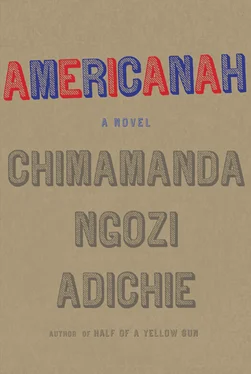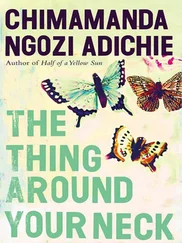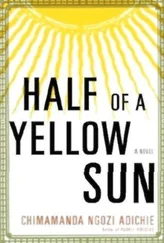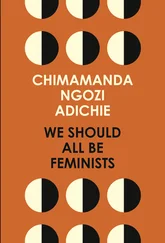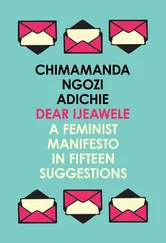Now, she slipped her hand from his as they walked back to class. Whenever she felt this way, panic would slice into her at the slightest thing, and mundane events would become arbiters of doom. This time, Ginika was the trigger; she was standing near the staircase, her backpack on her shoulder, her face gold-streaked in the sunlight, and suddenly Ifemelu thought how much Ginika and Obinze had in common. Ginika’s house at the University of Lagos, the quiet bungalow, the yard crowned by bougainvillea hedges, was perhaps like Obinze’s house in Nsukka, and she imagined Obinze realizing how better suited Ginika was for him, and then this joy, this fragile, glimmering thing between them, would disappear.

OBINZE TOLD HER, one morning after assembly, that his mother wanted her to visit.
“Your mother?” she asked him, agape.
“I think she wants to meet her future daughter-in-law.”
“Obinze, be serious!”
“I remember in primary six, I took this girl to the send-off party and my mom dropped both of us off and gave the girl a handkerchief. She said, ‘A lady always needs a handkerchief.’ My mother can be strange, sha . Maybe she wants to give you a handkerchief.”
“Obinze Maduewesi!”
“She’s never done this before, but then I’ve never had a serious girlfriend before. I think she just wants to see you. She said you should come to lunch.”
Ifemelu stared at him. What sort of mother in her right mind asked her son’s girlfriend to visit? It was odd. Even the expression “come to lunch” was something people said in books. If you were Boyfriend and Girlfriend, you did not visit each other’s homes; you registered for after-school lessons, for French Club, for anything that could mean seeing each other outside school. Her parents did not, of course, know about Obinze. Obinze’s mother’s invitation frightened and excited her; for days, she worried about what to wear.
“Just be yourself,” Aunty Uju told her and Ifemelu replied, “How can I just be myself? What does that even mean?”
On the afternoon she visited, she stood outside the door of their flat for a while before she pressed the bell, suddenly and wildly hoping that they had gone out. Obinze opened the door.
“Hi. My mom just came back from work.”
The living room was airy, the walls free of photographs except for a turquoise painting of a long-necked woman in a turban.
“That’s the only thing that is ours. Everything else came with the flat,” Obinze said.
“It’s nice,” she mumbled.
“Don’t be nervous. Remember, she wants you here,” Obinze whispered, just before his mother appeared. She looked like Onyeka Onwenu, the resemblance was astounding: a full-nosed, full-lipped beauty, her round face framed by a low Afro, her faultless complexion the deep brown of cocoa. Onyeka Onwenu’s music had been one of the luminous joys of Ifemelu’s childhood, and had remained undimmed in the aftermath of childhood. She would always remember the day her father came home with the new album In the Morning Light; Onyeka Onwenu’s face on it was a revelation, and for a long time she traced that photo with her finger. The songs, each time her father played them, made their flat festive, turned him into a looser person who sang along with songs steeped in femaleness, and Ifemelu would guiltily fantasize about him being married to Onyeka Onwenu instead of to her mother. When she greeted Obinze’s mother with a “Good afternoon, ma,” she almost expected her, in response, to break into song in a voice as peerless as Onyeka Onwenu’s. But she had a low, murmuring voice.
“What a beautiful name you have. Ifemelunamma,” she said.
Ifemelu stood tongue-tied for seconds. “Thank you, ma.”
“Translate it,” she said.
“Translate?”
“Yes, how would you translate your name? Did Obinze tell you I do some translation? From the French. I am a lecturer in literature, not English literature, mind you, but literatures in English, and my translating is something I do as a hobby. Now translating your name from Igbo to English might be Made-in-Good-Times or Beautifully Made, or what do you think?”
Ifemelu could not think. There was something about the woman that made her want to say intelligent things, but her mind was blank.
“Mummy, she came to greet you, not to translate her name,” Obinze said, with a playful exasperation.
“Do we have a soft drink to offer our guest? Did you bring out the soup from the freezer? Let’s go to the kitchen,” his mother said. She reached out and picked off a piece of lint from his hair, and then hit his head lightly. Their fluid, bantering rapport made Ifemelu uncomfortable. It was free of restraint, free of the fear of consequences; it did not take the familiar shape of a relationship with a parent. They cooked together, his mother stirring the soup, Obinze making the garri, while Ifemelu stood by drinking a Coke. She had offered to help, but his mother had said, “No, my dear, maybe next time,” as though she did not just let anyone help in her kitchen. She was pleasant and direct, even warm, but there was a privacy about her, a reluctance to bare herself completely to the world, the same quality as Obinze. She had taught her son the ability to be, even in the middle of a crowd, somehow comfortably inside himself.
“What are your favorite novels, Ifemelunamma?” his mother asked. “You know Obinze will only read American books? I hope you’re not that foolish.”
“Mummy, you’re just trying to force me to like this book.” He gestured to the book on the kitchen table, Graham Greene’s The Heart of the Matter . “My mother reads this book twice a year. I don’t know why,” he said to Ifemelu.
“It is a wise book. The human stories that matter are those that endure. The American books you read are lightweights.” She turned to Ifemelu. “This boy is too besotted with America.”
“I read American books because America is the future, Mummy. And remember that your husband was educated there.”
“That was when only dullards went to school in America. American universities were considered to be at the same level as British secondary schools then. I did a lot of brushing-up on that man after I married him.”
“Even though you left your things in his flat so that his other girlfriends would stay away?”
“I’ve told you not to pay any attention to your uncle’s false stories.”
Ifemelu stood there mesmerized. Obinze’s mother, her beautiful face, her air of sophistication, her wearing a white apron in the kitchen, was not like any other mother Ifemelu knew. Here, her father would seem crass, with his unnecessary big words, and her mother provincial and small.
“You can wash your hands at the sink,” Obinze’s mother told her. “I think the water is still running.”
They sat at the dining table, eating garri and soup, Ifemelu trying hard to be, as Aunty Uju had said, “herself,” although she was no longer sure what “herself” was. She felt undeserving, unable to sink with Obinze and his mother into their atmosphere. “The soup is very sweet, ma,” she said politely. “Oh, Obinze cooked it,” his mother said. “Didn’t he tell you that he cooks?”
“Yes, but I didn’t think he could make soup, ma,” Ifemelu said. Obinze was smirking.
“Do you cook at home?” his mother asked.
Ifemelu wanted to lie, to say that she cooked and loved cooking, but she remembered Aunty Uju’s words. “No, ma,” she said. “I don’t like cooking. I can eat Indomie noodles day and night.”
His mother laughed, as though charmed by the honesty, and when she laughed, she looked like a softer-faced Obinze. Ifemelu ate her food slowly, thinking how much she wanted to remain there with them, in their rapture, forever.
Читать дальше
